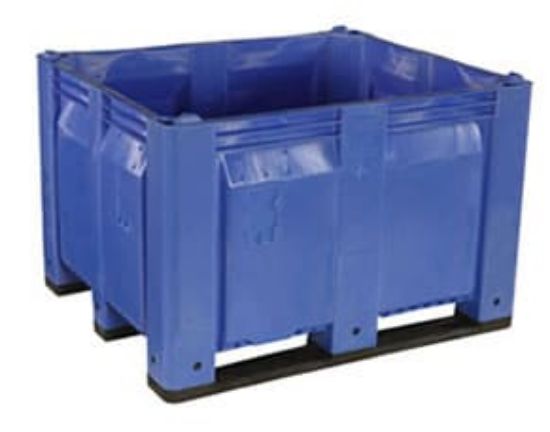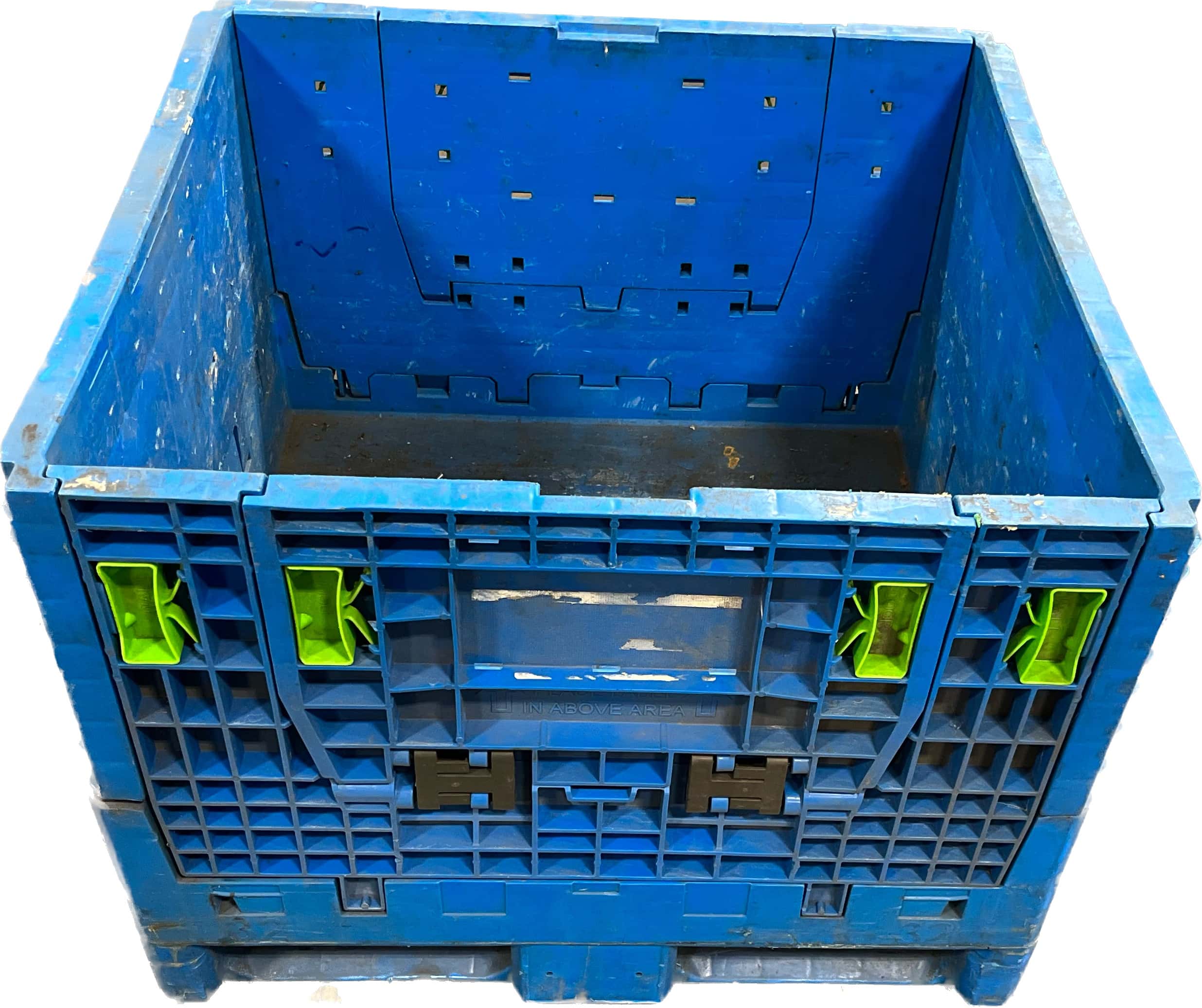Why refurbished bulk containers are smart solutions for sustainable businesses
The Ultimate Guide to Choosing the Right Bulk Containers for Your Organization Needs
Choosing the appropriate mass containers is vital for any kind of service that depends on efficient logistics. Various types of containers exist, each created for specific products and applications. Factors such as dimension, material compatibility, and regulative standards play a significant function in this decision-making process. Understanding these elements can bring about boosted operational efficiency. Lots of services ignore essential aspects that could enhance their total efficiency and sustainability. What are these factors to consider?
Comprehending Different Kinds Of Bulk Containers
Bulk containers act as important devices for services seeking reliable storage space and transportation remedies. These containers are available in different kinds, each designed to fulfill details operational demands. One typical type is the intermediate bulk container (IBC), which is perfect for liquid and granulated products, using an equilibrium of ability and maneuverability. An additional popular alternative is the mass bag, or FIBC, ideal for completely dry, flowable products. These adaptable containers are light-weight and can be easily delivered and kept. For larger materials, rigid mass containers are commonly employed, giving resilience and stability for risk-free handling. In addition, there are specific containers tailored for harmful products, guaranteeing conformity with security policies. Understanding the distinct attributes of these bulk container types permits organizations to make enlightened decisions that maximize logistics and reduce prices. By choosing the right container, firms can boost their operational performance and enhance their supply chain processes.
Trick Material Factors To Consider for Mass Containers
When selecting bulk containers, it is essential to ponder the products utilized in their building. Elements such as chemical, durability, and strength compatibility play an important duty in making sure the containers satisfy certain operational requirements. Additionally, weight and mobility issues can impact both efficiency and transportation logistics.
Material Durability and Strength
Durability and toughness are essential elements in selecting products for bulk containers, as they directly influence the container's capacity to withstand different ecological problems and taking care of processes. Materials such as high-density polyethylene (HDPE), polypropylene, and stainless steel are typically favored for their robust residential or commercial properties, using resistance to influence, temperature, and abrasion changes. The selection of material likewise affects the overall life expectancy of the container; more powerful products typically cause much less constant replacements, leading to cost savings gradually. Furthermore, the weight of the material can impact delivery prices and convenience of handling. Companies must consider their particular operational environments and the possibility for wear and tear to guarantee peak durability and strength in their mass container choice.
Chemical Compatibility Aspects
Comprehending chemical compatibility is crucial for picking mass containers, as the products utilized should withstand the particular compounds they will hold. Numerous elements influence compatibility, including the chemical nature of the materials, temperature, and duration of storage. As an example, destructive chemicals may call for containers made from stainless steel or specialized plastics that stand up to deterioration. Furthermore, responsive materials can produce heat or gases, requiring aired vent or pressure-rated containers. The option of container product, whether polycarbonate, polyethylene, or steel, ought to straighten with the chemical residential properties of the stored substances to avoid breaches or leaks. Eventually, a comprehensive assessment of these compatibility variables assures risk-free handling and storage, safeguarding both employees and the setting while preserving item stability.
Weight and Mobility Issues
Selecting mass containers involves not only evaluating chemical compatibility yet also considering weight and mobility. Businesses need to analyze the convenience of handling and transport to enhance efficiency. Light-weight products like high-density polyethylene (HDPE) or light weight aluminum can promote easier movement and decrease shipping prices. Alternatively, heavier containers might give enhanced sturdiness yet can prevent mobility, particularly in environments calling for constant moving. In addition, the style of the container must permit practical lifting and piling, making sure ergonomic safety for workers. Companies need to likewise consider the facilities available for transport; for example, containers compatible with forklifts or pallet jacks can improve operations. Inevitably, the best balance between weight and portability straight affects operational efficiency and price performance.
Sizing Your Bulk Containers for Ideal Effectiveness
When sizing bulk containers, services should carefully analyze the measurements required to fit their certain products. Additionally, weight capacity is a crucial aspect that affects efficiency and security during transportation and storage. Effective sizing not only makes the most of space however also maximizes functional process.
Determining Container Capacities
Selecting the ideal dimensions for mass containers is essential for making best use of performance in storage and transportation. Businesses have to evaluate their particular demands, thinking about factors such as available room, the nature of the items being saved, and the techniques of transport used. Accurate measurements ensure that containers fit ideally in storage facilities and cars, minimizing squandered area and lowering managing time. Standard dimensions can provide benefit, yet custom-made measurements may be needed for one-of-a-kind requirements or to fit specific products. Furthermore, it is necessary to evaluate stacking abilities and access, as these factors affect overall operational effectiveness. Eventually, the appropriate dimensions result in enhanced organization and structured logistics, benefiting the general productivity of business.
Weight Ability Considerations
Understanding weight capability is essential for organizations intending to enhance their bulk container efficiency. The weight ability of a container directly affects storage capacities, transport logistics, and overall functional expenses. Picking containers with the ideal weight limits assures that companies can securely save and transport their goods without running the risk of damage or conformity problems. Overwhelming containers can result in structural failings, while underutilizing ability cause thrown away resources. When selecting containers, it is important for businesses to examine their product weights and consider any regulative demands. Furthermore, elements such as the sort of product, planned use, and ecological problems should also influence weight ability decisions. By assessing these components, businesses can boost performance and ensure a streamlined supply chain.
Governing Conformity and Safety Specifications

Regulative conformity and safety requirements play a crucial duty in the selection of mass containers for services. Organizations has to assure that their containers meet various guidelines set by regional, national, and global authorities. These standards usually relate to product security, structural stability, and appropriate labeling, which aid prevent mishaps and assure the risk-free transportation of goods.
In addition, adherence to industry-specific guidelines, such as those from the Fda (FDA) or the Occupational Security and Wellness Management (OSHA), is vital for companies dealing with harmful products or foodstuff. Non-compliance can result in fines, lawful concerns, or damages to a business's credibility.
Companies need to likewise take into consideration the container's compatibility with the products being kept or moved to prevent contamination or chemical reactions (used plastic containers). To sum up, comprehending and their explanation implementing regulative conformity and security standards is vital for the liable and reliable usage of mass containers
Sustainability Choices for Eco-Friendly Mass Containers

Business are additionally discovering choices made from recycled products, which not just save sources yet also support the recycling sector. Innovations in layout permit for lighter containers that need much less energy to transport, further enhancing sustainability. By incorporating these environmentally friendly bulk container options, services can demonstrate their dedication to environmental stewardship while meeting customer need for sustainable methods. This shift not only assists the earth yet can also boost brand credibility and consumer commitment.
Cost-Effectiveness and Budgeting for Bulk Containers
While numerous organizations concentrate on sustainability, cost-effectiveness continues to be an important factor when choosing bulk containers. Organizations you can try these out must assess the preliminary acquisition cost, in addition to long-term operational prices, to ensure financial stability. Factors such as maintenance, reusability, and sturdiness play a considerable duty in identifying overall costs.
Purchasing top quality containers may yield greater ahead of time costs however can lead to financial savings through minimized substitute rates and lowered waste. Additionally, organizations ought to consider transportation expenses and storage space effectiveness, as these can impact the overall budget plan.

Often Asked Concerns
Just how Do I Figure Out the Right Container for Hazardous Products?
To identify the right container for unsafe materials, one have to examine compatibility with the compound, think about the container's product, check for regulatory conformity, and analyze capability and security attributes to guarantee appropriate handling and storage.
Can Mass Containers Be Customized for Specific Products?
Yes, bulk containers can be personalized for details products. used bulk containers. Different features, such as material, size, and style, can be tailored to meet one-of-a-kind demands, making sure perfect safety and efficiency for transporting and storing different items
What Is the Typical Lifespan of Various Bulk Container Kind?
The ordinary life-span of bulk container kinds varies; plastic containers last 5-10 years, steel containers 10-20 years, and wood containers commonly last 3-7 years, depending upon use, upkeep, and environmental problems.
Just how Should I Tidy and Maintain Mass Containers?
To clean up and preserve bulk containers, one must consistently examine for damage, get rid of residue, wash with appropriate cleaning agents, rinse extensively, and warranty appropriate drying before storage space. Complying with manufacturer standards boosts longevity and safety during usage.
Exist Rental Options for Bulk Containers Available?
Yes, countless business offer rental alternatives for bulk containers, giving versatility for services. These services can accommodate different requirements, permitting companies to handle inventory successfully without the commitment of purchasing containers outright.
Durability and strength are essential elements in choosing products for bulk containers, as they straight affect the container's capacity to stand up to different environmental problems and taking care of procedures. Recognizing chemical compatibility is essential for picking mass containers, as the products made use of need to withstand the particular substances they will certainly hold. Comprehending weight capacity is vital for organizations intending to maximize their bulk container effectiveness. Regulative conformity and security requirements play a necessary role in the choice of mass containers for companies. While many organizations focus on sustainability, cost-effectiveness continues to be an important variable pop over to these guys when choosing bulk containers.